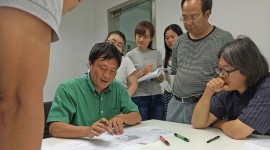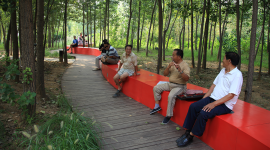2023 Oberlander Prize Jury Citation
The seven-member Oberlander Prize Jury includes leading landscape architects, urban planners, architects, academics, and other experts from around the world: Jury Chair, Elizabeth Mossop, Dean of the University of Technology Sydney School of Design, Architecture and Building (Australia); Christian Benimana, Co-Executive Director and Senior Principal, MASS Design Group (Rwanda); Consuelo Bravo, owner of Panorama (Chile); Adriaan Gueze, a Founder of West 8 urban design & landscape architecture (The Netherlands); Leonard Ng Keok Poh, Ramboll Studio (Singapore); Kotchakorn Voraakhom, CEO and Founder of Landprocess and Porous City Network (Thailand); and Jane Wolff, University of Toronto (Canada).
The Oberlander Prize Jury Citation:
A brilliant and prolific designer, Kongjian Yu is also a force for progressive change in landscape architecture around the world. Through built works, lectures, publications, teaching, and a series of celebrated letter to the leaders of China, he has striven to direct landscape practices away from a destructive confrontation with natural forces toward a more optimistic position of cooperation and adaptation.
Yu and his firm, Turenscape, have had a profound impact on landscape design in China, manifest in both the astonishing number and quality of their design projects. They have created socially and ecologically resilient public places, some of which, like the Zhongshan Shipyard Park, address industrial and labor history, while others encompass urban agriculture or water purification wetlands, such as the Shanghai Houtan Park. While using modern forms and materials, their projects evoke vernacular landscape practices—agricultural fields and rice paddies, for instance—that Yu embraced from his rural upbringing. They have also distinguished themselves for opposing conventional civil engineering approaches to water management. Along numerous rivers, they have removed concrete floodwalls, replacing them with a strategy they call “a green sponge system,” as at the Sanya Dong’an Wetland Park on Hainan Island, evoking an ancient Chinese tradition of creating water retention and infiltration zones in flood-prone river cities. In all instances, Yu and his firm pursue a goal of nature-based solutions to problems created or compounded by climate change.
Yu has managed both to take advantage of China’s convulsive urbanization and to challenge it.
Through books, lectures, and letters, he has courageously reached out to large and small city mayors and party officials to foster his more collaborative approach to natural systems at the urban scale and to promote his National Ecological Security Pattern Plan, intended to safeguard biological, cultural and recreational resources by protecting the ecosystem services on which they depend. His work has paid off in projects for cities across the country and in the adoption of the “sponge city” concept as national policy by President Xi Jinping in 2014.
Yu is aware that his work alone cannot be deployed at a scale equivalent to current environmental challenges. Through his teaching and administrative work as Professor and Dean in the College of Architecture and Landscape Architecture at Peking University, he is building the intellectual and professional capacity to meet these needs. He has helped to train over 1,200 graduate level landscape architects and is the chief editor of Landscape Architecture Frontiers (formerly Landscape Architecture China), a bi-monthly publication that is the only entirely bilingual Chinese periodical exploring contemporary landscape research and practice.
For both the quality of his design and his tireless advocacy for the leadership role that the profession can and must take in addressing the global challenges of environmental degradation and climate change, the jury is pleased and honored to award Kongjian Yu the 2023 Cornelia Hahn Oberlander International Landscape Architecture Prize.







